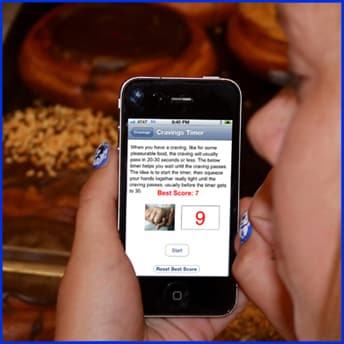
We know Robert Pretlow, M.D., as a pediatrician and childhood obesity expert, director of Weigh2Rock.com, writer of many articles (most recently, an important one published by the journal Eating Disorders), and author of Overweight: What Kids Say. As we have been discussing, Dr. Pretlow is also the developer of an iPhone app based on the addiction model of obesity.
His recent introduction of the iPhone app to the American Academy of Pediatrics is available as a PDF file, and one of the things it says is,
Self-esteem and coping skills augmentation, along with stress management techniques, peer/mentor support, and motivational tools are the necessary skills needed for recovery from food addiction and resulting obesity in children.
The iPhone app supplies all these needs. There is a Progress Report area for weighing in, and opportunities for support from peers, a special weight-loss buddy, or a professional mentor. There is the Problem Foods Control Panel to facilitate withdrawal and abstinence, and…
Cravings, Vicious Cycles, Coping Skills, Activity Fun, and Self-Esteem areas to enhance personal resilience needed for withdrawal and abstinence, and to avoid re-addiction…
One of the highlights described is the Cravings Timer. When cravings strike, kids can keep track of how long the resistance lasted and work toward beating their own scores on each subsequent occasion. One member of the study group says,
My problem food control panel is very helpful. You can see how long you have gone without giving into temptation and it makes you think, ‘Do I really want to go through all this hard work and throw it out the window for a few minutes of comfort food?’
And if self-talk doesn’t work, the child or teen can reach out to the network of fellow users or to one particular buddy. There is also an option for mentoring from health professionals. Someone who is more visual than verbal might choose to take a picture of her or his own face, and see how it looks on a body 20 or 50 pounds leaner than the scale currently reads. How fun! It’s even better than trying on new hairstyles.
This feature is useful to anyone of any age, with a habit they’re trying to tame. You make a list of fun activities, or just plain distracting activities. Why? Because when the urge comes upon a person to self-destruct by eating or drinking, the brain fogs over, and the thoughts narrow into the kind of tunnel vision where something full of empty calories is the only picture the mind is able to conjure up. But one click can bring up that list and remind a person that there is a big world full of other things to do.
This ought to be specially helpful for a young folks who don’t respond positively to parental suggestions such as “Walk the dog.” But where they wouldn’t take it from a grownup, they seem to be okay with taking it from an electronic device. Another thing about kids is, they are embarrassed to be seen doing anything weird, especially if they are already stigmatized for some reason, like being fat. But nowadays everybody is always pecking away at their cell phones. The behavior is perfectly normal and acceptable.
As Dr. Pretlow’s presentation notes,
Participants were able to take the app wherever they went, thus it was available ‘in the moment’ for impending binges or overwhelming cravings.
Pediatricians interested in a randomized control trial are invited to contact
Robert A. Pretlow, M.D., MSEE, FAAP, at: 206-448-4414 or![]()
Your responses and feedback are welcome!
Source: “iPhone App Presentation”(PDF), Weigh2Rock.com

 FAQs and Media Requests:
FAQs and Media Requests: 











